Japan: More and more, a land of centenarians
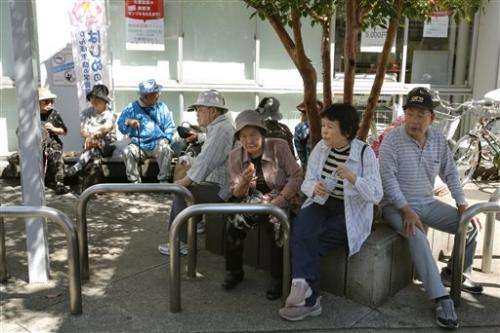
Reaching the century mark remains a relative rarity for humans, but it is increasingly less so, and perhaps nowhere more than in rapidly aging Japan.
The number of Japanese who are at least 100 years old, known as centenarians, has reached 58,820, according to the latest government estimate, released every September to mark Respect-for-the-Aged Day, a national holiday that falls on Monday.
A Japanese woman is the oldest person in the world, 116-year-old Misao Okawa, according to Guinness World Records.
The oldest man is also Japanese, 111-year-old Sakari Momoi. Somewhat appropriately, one of the Japanese characters in Momoi's last name means "100," and his first name Sakari translates as flourishing or the prime of life.
Advances in health care are contributing to increased longevity in Japan and elsewhere. Japan now has 46.21 centenarians for every 100,000 people.
— WOMEN LIVE LONGER: Nearly 90 percent of Japan's centenarians are females.
— LONG LIVES: Japan ranks near the top in average life expectancies: 86.61 years for women and 80.21 years for men.
— THE GLOBAL PICTURE: The population of centenarians stood at 441,000 in 2013 and is projected to grow to 3.4 million by 2050, according to the United Nations.
— IN THE U.S.: The United States had 53,364 people who were at least 100 years old in the 2010 Census, or 17.28 per 100,000 people.
-
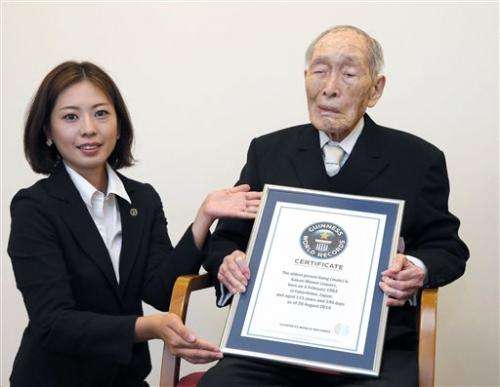
In this Aug. 20, 2014 file photo, Sakari Momoi, a 111-year-old retired Japanese educator, poses for a photo after receiving a certificate from a Guinness World Records official in Tokyo when he was recognized as the world's oldest living man, succeeding Alexander Imich of New York, who died in April at the age of 111 years, 164 days. The number of people who are at least 100 years old, known as centenarians, has reached 58,820 in Japan, one of the most rapidly aging countries in the world. The government updates the estimate every September to mark Respect-for-the-Aged Day, a national holiday that falls on Monday, Sept. 15, 2014. Japan now has 46.21 centenarians per 100,000 people. A Japanese woman is the oldest person in the world, 116-year-old Misao Okawa, according to Guinness World Records. The oldest man is Momoi. One of the Japanese characters in Momoi's last name means "100," and his first name Sakari translates as flourishing or the prime of life. (AP Photo/Kyodo News, File) JAPAN OUT, CREDIT MANDATORY -
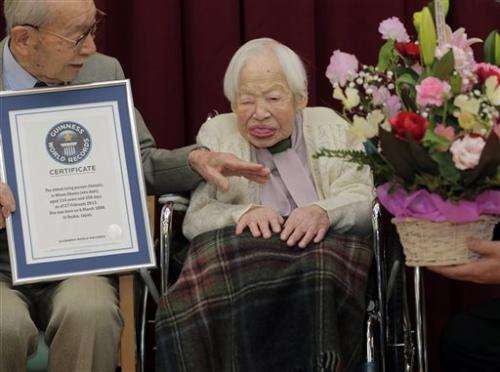
In this Feb. 27, 2013 file photo, Japan's then 114-year-old Misao Okawa, right, and her then 90-year-old son Hiroshi Okawa pose with the Guinness World Records certificate of the world's oldest woman at a nursing home in Osaka, western Japan, when she received the official certificate from the Guinness World Records. The number of people who are at least 100 years old, known as centenarians, has reached 58,820 in Japan, one of the most rapidly aging countries in the world. The government updates the estimate every September to mark Respect-for-the-Aged Day, a national holiday that falls on Monday, Sept. 15, 2014. Japan now has 46.21 centenarians per 100,000 people. The oldest person in the world is 116-year-old Okawa, according to Guinness World Records. (AP Photo/Itsuo Inouye, File) -
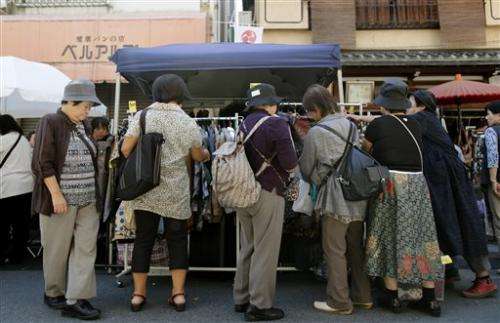
In this photo taken Sunday, Sept. 14, 2014, an elderly shopper looks at goods on a sidewalk in Tokyo. Reaching the century mark remains a relative rarity for humans, but it is increasingly less so, and perhaps nowhere more than in rapidly aging Japan. The number of Japanese who are at least 100 years old, known as centenarians, has reached 58,820, according to the latest government estimate, released every September to mark Respect-for-the-Aged Day, a national holiday that falls on Monday, Sept. 15. (AP Photo/Shizuo Kambayashi) -
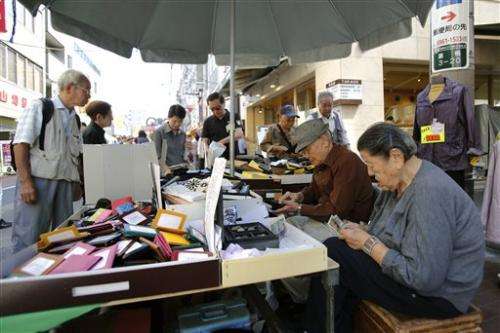
In this photo taken Sunday, Sept. 14, 2014, an elderly vendor counts money in Tokyo, Sunday. Reaching the century mark remains a relative rarity for humans, but it is increasingly less so, and perhaps nowhere more than in rapidly aging Japan. The number of Japanese who are at least 100 years old, known as centenarians, has reached 58,820, according to the latest government estimate, released every September to mark Respect-for-the-Aged Day, a national holiday that falls on Monday, Sept. 15. (AP Photo/Shizuo Kambayashi) -
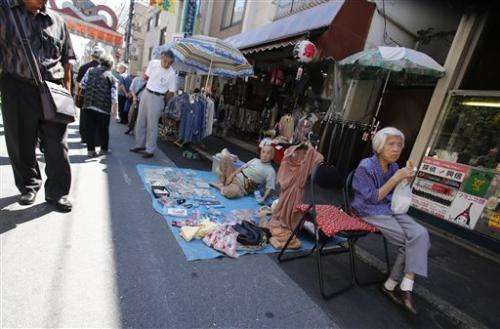
In this photo taken Sunday, Sept. 14, 2014, an elderly man waits for shoppers in Tokyo. Reaching the century mark remains a relative rarity for humans, but it is increasingly less so, and perhaps nowhere more than in rapidly aging Japan. The number of Japanese who are at least 100 years old, known as centenarians, has reached 58,820, according to the latest government estimate, released every September to mark Respect-for-the-Aged Day, a national holiday that falls on Monday, Sept. 15. (AP Photo/Shizuo Kambayashi)
© 2014 The Associated Press. All rights reserved.
















